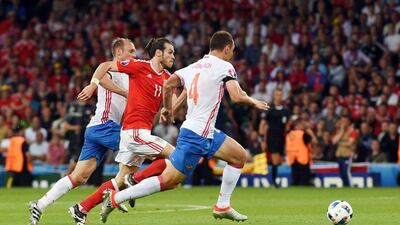Russia 0
Wales 3 (Ramsey 11', Taylor 20', Bale 67')
The European Championship has said bye-bye to the big bad bear.
If Russia was not the most populous nation represented at this tournament, it would be tempting to report that not many will miss them from the cast list of the knockout phase.
A number of those following a very ordinary team had already been expelled from France because of the violence they were deemed to have incited in Marseille on the second day of Euro 2016.
The team lasted two more games, and saw those out under probation of immediate elimination by Uefa if their supporters misbehaved again.
They lost both, first to Slovakia, and, now, on a night of wild Welsh celebration, to a side that have invested these Euros with a thrilling underdog spirit.
Wales march on, with the best choir in the grandstands, with Gareth Bale, and a powerful breeze in their sails. Their 3-0 win over Russia was a stunning triumph.
“We wanted to be recognised for the work we’ve put it,” said Aaron Ramsey, scorer of the night’s first goal. “It was fantastic performance.”
Inside the Toulouse stadium, Russia’s fans were largely subdued, perhaps in disbelief at how easily Wales’s players scythed through the Russian defence and midfield.
Some context: That’s Wales, a country with a population of just over three million, but apparently with a great deal more manpower on the pitch as they ran Russia – population 147m - ragged to go 2-0 ahead with 20 minutes on the clock.
More Euro 2016
Photo gallery: Gareth Bale puts finishing touches on Wales' victory as Russia eliminated in Group B
Richard Jolly: England finish Group B runners-up after frustrating goalless draw against Slovakia
That’s Wales, in their first major tournament for almost 60 years, a small nation who join Algeria, Greece and Slovenia as the countries who have cut short Russia’s adventures in the most recent World Cups and European championships. It is now eight years since Russia progressed beyond the first phase of a premier competition.
That looks like a crisis, and an even deeper one given what is ahead.
The big stage of international football could not quite say good riddance, and don’t return for a while, to a Russia who have played poorly and some of whose fans have been a menace. It could only say au revoir. In 103 weeks’ time, Moscow will be hosting the opening match of the 2018 World Cup finals, and Russia will be in it.
Quite how many of the bedraggled players who trooped away from Toulouse will be there is worth wondering.
Wales, who were zippy, determined and confident throughout, made Russia look fatigued and superannuated. Were this a callow Russian squad sent to France to mature with a view to peaking at their own World Cup, an overwhelming defeat like that Wales inflicted might have been more easily forgiven.
But Russia lined up with six players who will be well into their 30s by June 2018.
They lined up, too, with genuine prospects of continuing in France. A win against Wales would have propelled Russia, who had a point from their draw against England, into a strong position to stay involved in these championships, provided their fans conducted themselves sensibly.
But they were torn this way and that by a rampant Wales, the bear cowering in the face of the dynamic dragon.
Empty though Russia appeared, of energy, or initiative, Wales were excellent, profiting against a sluggish defence from their tactical set-up, a 3-4-3 when they were in attack.
Their wing-backs thrived, one of them, Neil Taylor, scoring his first goal for more than six years at any level of football. He had found space on the overlap, as his team-mates did throughout the night. The Welsh converted all three of their goals in situations where the scorers, Ramsey, Taylor and Bale were one-on-one with the poor goalkeeper Igor Akinfeev.
For Wales, it will remain a historic night.
Reminders about how long it has been since the Principality has appeared in a major tournament finals have been with them since they qualified to be in France.
To know that they are not here simply because of this tournament’s expanded format, a 24-country event rather than the usual 16, is another boost. They are 90 minutes away now from the quarter-finals, and, by topping the group, ought to have given themselves a very strong chance of avoiding the calibre of opponent that proved too high a hurdle the last time they joined the game’s elite in high summer.
That was at the 1958 World Cup. They were knocked out by Brazil.
Finishing higher than England in Group B is a feather in the Welsh cap too. As important, they settled an old score be demolishing the Russians.
Thirteen years ago, Wales were denied a place at the finals of Euro 2004 after they narrowly lost a play-off against Russia, losing the Cardiff leg 1-0 after having returned from Moscow with a creditable goalless draw.
After the tie was over it emerged one of the Russian players, Yegor Titov, who participated in the second leg, had tested positive for a banned substance. Wales appealed that the result be annulled. Their case was rejected.
Russian sport, of course, has had a great deal more trouble with the use of performance-enhancing substances since then. The IAAF have just banned the country’s athletes from this summer’s Rio de Janeiro Olympic Games, having found they were working within a culture of systematic doping, even if not every individual sportsperson was implicated.
It has been a bad week for Russia all round. It has many sporting reputations to mend right now.
Follow us on Twitter @NatSportUAE
Like us on Facebook at facebook.com/TheNationalSport


